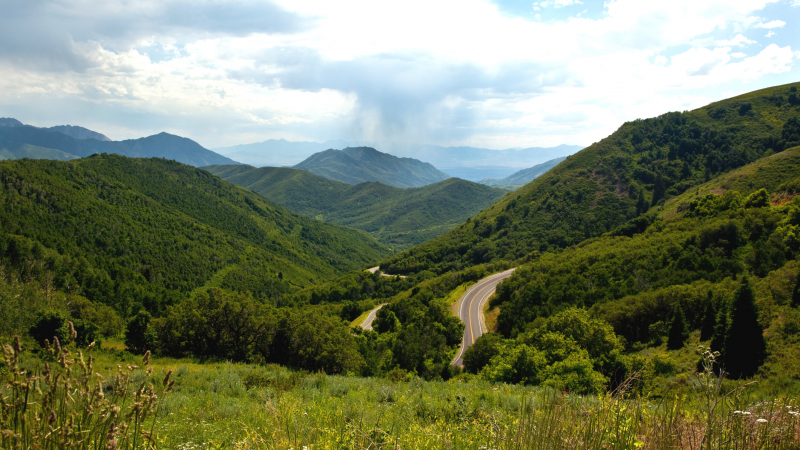News
Four of the most significant borders in Latin America are involved in regional improvement and development through EUROFRONT. Since 2020, the seven countries involved in them have joined this European Union-financed programme. After a start conditioned by the context of the international health crisis and the consequent closure of borders, currently the seven partner countries (Argentina, Bolivia, Brazil, Colombia, Ecuador, Paraguay and Peru) are actively working on the ground together with the team of experts designated by FIIAPP (Spain), IILA (Italy) and the International Organisation for Migration (OIM). In this article, we review the main milestones of the past year at each of these border points and what guides the strategic lines for 2022.

As Mr Jorge de la Caballería pointed out on 14 February during his recent visit to Paraguay accompanied by the Programme team: “the more networks to share information, the better the results”. De la Caballería thus stressed the importance of collaboration between nations and cooperation agencies to achieve common goals, in this case, Integrated Border Management applied to Latin America and the fight against human trafficking and migrant smuggling.
In addition to the main activities detailed below, EUROFRONT has developed diagnostic studies, proposals, webinars, capacity building, dissemination and awareness raising activities linked to the main pillars of work of Component 1 and Component 2.
Rumichaca (Colombia and Ecuador): next technical visit from 14 March
The main objective of the Programme is to provide cooperation tools among neighbouring countries, as well as to strengthen the existing strategies of the member countries and exchange good practices that have been or are proving to be beneficial in other regional contexts. In Rumichaca, this exchange began in 2020 remotely together with experts and authorities linked to the border. Additionally, in March 2021, delegations from Colombia and Ecuador travelled to Costa Rica and Panama to take note of the experience developed in the Paso Canoas Binational Police Cooperation Centre, promoted by the El PAcCTO programme.
In October 2021, the Republic of Ecuador received a delegation from the EUROFRONT team (FIIAPP, IILA, IOM) in order to hold meetings with government authorities and visit the Rumichaca border crossing. "We believe that the European model of Comprehensive Border Management is valuable with regard to developing the model we want in Ecuador", said Juan Francisco Loaiza, Under-secretary for Migration at the Ministry for Government of Ecuador, during the meeting. For his part, the European Union Ambassador in Ecuador, Charles-Michel Geurts, underlined that the Programme to "contribute to the security, respect and protection of the human rights of migrants” had been well received. Additionally, support was provided to the government of Ecuador in the socialisation of monitoring and registration systems on human trafficking and migrant smuggling.
Currently, the team is planning to visit the other side of the Rumichaca border, with the collaboration of the Republic of Colombia. Additionally, taking place will be the field mission of the Spanish National Police Inspector, José Luis Mateos Martín, who is the expert assigned specifically to this border during the medium term, and who was already in Ecuador at the end of last year.
Desaguadero (Bolivia and Peru): example of cooperation between different programmes in Latin America and Europe
In September 2021, the first technical visit to the Desaguadero border was carried out with the collaboration of the Peruvian government. In the words of Silvia Mori, General Director of Democratic Security of the Ministry for the Interior of Peru, this opportunity constituted "an invitation for each sector and institution, within the scope of their respective competences, to evaluate and seek to take specific actions on the border problem” within the framework of the week around the International Day Against Sexual Exploitation and Human Trafficking (23 September).
In mid-November 2021, María de los Ángeles Paiva, an expert assigned specifically to the Desaguadero border, travelled to this border point to carry out her mission of collecting information and exchanging experiences on border management. Along these lines, during 2021 assessments of human trafficking were made in the Desaguadero border area, which were presented in January 2022 in La Paz by the programme's technical team.
On the other hand, during this period the Bolivian government received a visit from the EUROFRONT team, focused on this occasion on the Bermejo-Aguas Blancas border point. However, the commitment of the country's authorities and technical teams is applicable to all areas. The meetings began in La Paz, where Ms Cecilia Aróstegui, Director of Consular Affairs, recalled that in Bolivia there have been social and organisational conflicts that require the country to analyse how Comprehensive Border Management should be implemented: “we must start talking about the border considering it as an 'area' and not as a 'line'”.
At the end of November 2021, closing the circle of outstanding activities to date on the Desaguadero border, the Binational Authority of Lake Titicaca (ALT) organised a public meeting with authorities from Peru, Bolivia and experts in cooperation between Latin America and Europe, with the presence of EUROFRONT and EUROsoCIAL+, a European Union programme. Analysed in it were the keys to the future of Lake Titicaca as a link between Peru and Bolivia. The aim: to move towards the creation of a cross-border strategy for the security, governance and development of this region that contributes to improving people's lives and promoting social cohesion.
Bermejo-Aguas Blancas (Argentina and Bolivia): Comprehensive Border Management to improve migration policies
In November 2021, various authorities of the Government of Bolivia (Foreign Ministry, Ministry for Government, Migration Directorate, Bolivian Police and Ministry for Justice, among others), confirmed their commitment to cooperate to improve development and security in Latin America. The Vice Minister for Citizen Security of Bolivia stated during the visit: “EUROFRONT will allow us to improve our migration policy and fight against trafficking”. His words show the need to work together on the border from the perspective of comprehensive management.
As at the previous pilot borders, EUROFRONT sends a medium-term expert to Argentina-Bolivia. Juan del Valle, Chief Inspector of the Spanish National Police and currently responsible for the ETIAS-EES National Office (Smart Borders project) within the General Immigration and Borders Police Station, began his mission in November 2021, visiting the Bermejo-Aguas Blancas border. Likewise, a local assessment of human trafficking was carried out in this border area which included a presentation on the Regional Diagnosis for the Smuggling of Migrants from a gender perspective.
For its part, cooperation with the government of Argentina has become evident especially during activities carried out at the Triple Border, as we see below.
Triple Border (Paraguay, Argentina and Brazil): three technical field missions completed
The complexity of border management increases in a place where three nations coexist, and for this reason, to date the Triple Frontier is the place where the largest number of field technical missions have been carried out.
The on-site actions of the Programme began in July 2021, with the team’s reception on the part of the governments of Paraguay and Brazil. On this occasion, the Minister, Ms Cynthia Filártiga Lacroix, Director of International Cooperation at the Paraguayan Ministry for Foreign Affairs, underlined the importance of EUROFRONT as support for State agencies responsible for security and combating cross-border crime. For her part, Ms Georgia Diogo, Head of Special International Advisory Services for the Ministry for Justice and Public Security of Brazil, stated that: "The Programme team has been able to gain an in-depth idea about our realities and the mechanisms already implemented in the country so that future actions are more effective."
During this first occasion, the medium term expert assigned by Component I through IILA, the Italian policewoman Catia Marinangeli, also ventured into the field. During November, Marinangeli returned to both places and made her first technical visit to the Argentine side (Puerto de Iguazú), thus completing the first border assessment for EUROFRONT. On this website you can read the testimony of the expert comparing the situation of the Triple Frontier before and after the border closures. Marinangeli returned to the Triple Frontier for a third time, in January 2022.
In the context of the border, the Component II team also carried out a technical visit to the Argentine city of Puerto Iguazú taking into account the local scenario in relation to the crime of human trafficking, and analysing the regulatory framework, progress and trinational agreement so the latter could be taken into consideration in the programme action plan. Florencia Carignano, National Director of Migration of Argentina, pointed out the relevance of programmes such as EUROFRONT: “international cooperation helps us train and understand how the crime of human trafficking and smuggling varies across borders”.
Line of action
Social media news

